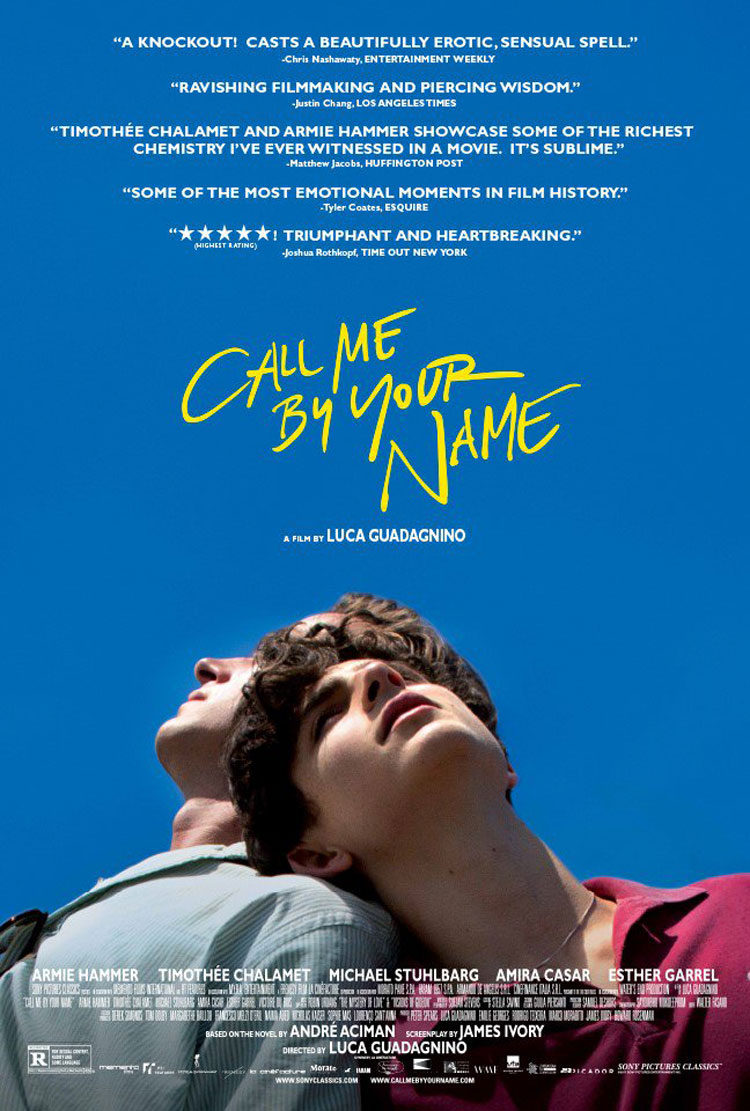
Director: Luca Guadagnino
Running Time: 132 mins
Certificate: 15
Release Date: October 27th 2017 (UK)

After garnering huge amounts of praise on its Sundance debut in January, many suggested Call Me By Your Name had the potential to be a Brokeback style mainstream crossover success. Although it’s unlikely to become the sort of box office hit Ang Lee’s 2005 Oscar-winner was, it is likely to appeal to a wider audience than most gay-themed movies, partly just due to its reputation.
The film, based on Andre Aciman’s acclaimed novel, is set in northern Italy in 1983, at the 17th Century villa of an American professor (Michael Stuhlbarg) and his family. Each summer the professor brings one of his students over, which results in 24-year-old Oliver (Armie Hammer) arriving at the house. He immediately catches the attention of the professor’s 17-year-old son, Elio (Timothee Chalamet).
With Elio’s precocious talents for music and ideas, he forms a friendship with Oliver. Slowly it begins to become something deeper, although both of them are uncertain how to handle it. Oliver is aware he is older and also the doctoral student of Elio’s father, while Elio is still figuring out his sexuality and what he wants from the world. However, with high culture and the beauty of nature around them, they head towards a love that could change both of them forever.
Call Me By Your Name is a deceptively simple film that avoids hyperbole and high drama. It simply tells a love story, where the conflict is largely internal for the two main characters rather than imposed on them by the world at large.
That’s very unusual for a gay-themed movie. Indeed, there’s an almost defiant feeling to the film of deliberately trying to avoid the queer cinema clichés of LGBT people as victims and subjects of oppression. While you might expect the characters to be feeling masses of angst about being gay/bisexual, this is only a relatively background issue for either of them – although both know they need to keep things secret. Likewise, it would be standard for Elio to be living in fear of homophobic parents, especially in the 1980s, but instead he has the sort of liberal family who seem to half realise what’s going on and don’t care that much.
Even the fact it’s set in 1983 but there’s no hint of AIDS in the narrative, doesn’t seem like a coincidence. The result is unusual in that it feels incredibly natural and beautifully crafted, but it’s also a story that can only exist in a world of exceptional financial and social privilege, especially for the early 80s. What that allows though is for the film to be about the relationship between the two men, instead of their romantic feelings being overwhelmed by the external forces of oppression, homophobia and gay ‘issues’.
That’s not to say it completely ignores the world at large and how same sex relationships were/are viewed. The quiet power of the ending of the film is predicated on that and our understanding of the social dimension of decisions that Oliver makes. Throughout the film there’s a quiet recognition of both the differences and similarities between same and opposite sex relationships, and that there are pressures for Elio and Oliver that wouldn’t exists if one of them were a girl. However, all of this is done quietly in the background, presented in a way that invites the viewer to empathise with the similarities and see them as far more important than the differences. Indeed, the age difference between a 17-year-old and a 24-year-old is quietly presented as potentially a more legitimate barrier to their romance than their gender. It is all this that in many respects will make it more palatable to straight audiences.
Click here to watch the trailer for Call Me By Your Name
Although you could take issue with how it ignores certain aspects of the LGBT experience in the early 80s, mostly the viewer is likely to be drawn into a beautiful and headily romantic world. The people are pretty, the weather is warm, and the world they’re living in is an isolated romantic idyll – and the combination of those things means there are plenty of good looking young people who are not wearing a vast amount of clothes. Although there may be an element of fantasy to that, Call Me By Your Name takes its characters and their lives seriously, carefully drawing Elio and Oliver together, so you understand what the connection means for both men. Particularly with Elio, it is extremely evocative of first teenage love, with the young man intellectually a very intelligent adult, but still finding his feet emotionally.
It also benefits from strong direction by Luca Guadagnino, who cleverly builds the characters and their world. He deliberately eschews convention, with shots that seem to either linger too long or cut off too short. Othertimes the camera roves in a way that seems to be avoiding what the viewer wants to see (and not just in the sex scenes), but it’s done in an extremely smart way to draw the audience in and get them to question what the characters will do and why. There are entire film studies essays that could be written just about how much of the evolution of the relationship between Elio and Oliver is constructed around the bathroom the two share, and how Oliver is shown taking a leak.
Of course a lot of the credit for this should go to Armie Hammer and most particularly a truly excellent performance from Timothee Chalamet, who is wonderfully expressive in a very quiet way as Elio. They also benefit from a script by James Ivory, whose best known as a director (The Remains Of The Day, Maurice), but here shows a very strong knack for words.
Call Me By Your Name is also pretty sexy, including a couple of scenes involving a peach that many will find particularly memorable. The second of the peach scenes is perhaps far more daring for a ‘mainstream’ release than it first appears. All Oliver is doing is trying to eat a peach – but when you think about what he’s really doing, and knowingly doing, it’s actually a surprisingly frank depiction of same sex behaviour that’s oddly intimately explicit while not actually showing a thing. Some may wish there was more full frontal nudity, but it’s still a sexy movie at times.
Admittedly, for a film with very little outward conflict, it is very long, and many will feel a bit of judicious editing wouldn’t have gone amiss. However, it’s so beautifully constructed that it just feels long rather than it’s dragging, and while the ending doesn’t give in and go for high drama and fireworks, it’s far more emotionally impactful than you’d expect something this quiet and psychologically internal to be able to be. The quiet thoughtfulness, beautiful imagery and romance also means it lingers in your brain.
Overall Verdict: Perhaps not the game-changing gay love story some have made it out to be, but Call Me By Your Name is a beautiful, delicate, sometimes sexy and incredibly absorbing romance.
Reviewer: Tim Isaac
Leave a Reply (if comment does not appear immediately, it may have been held for moderation)